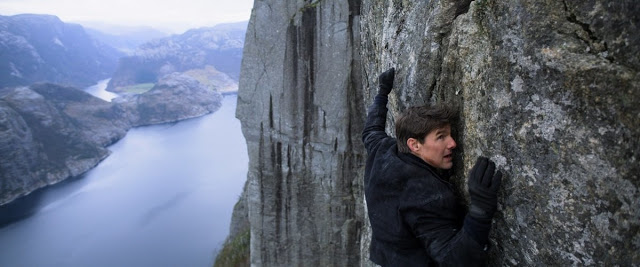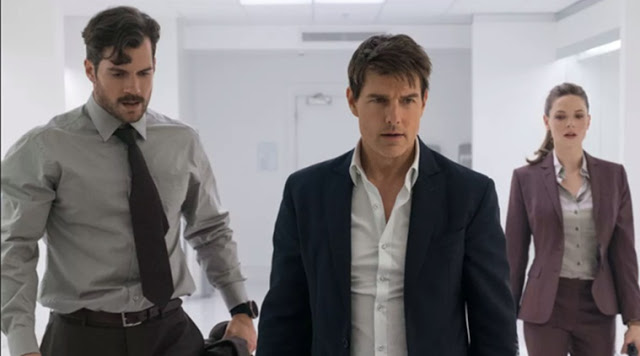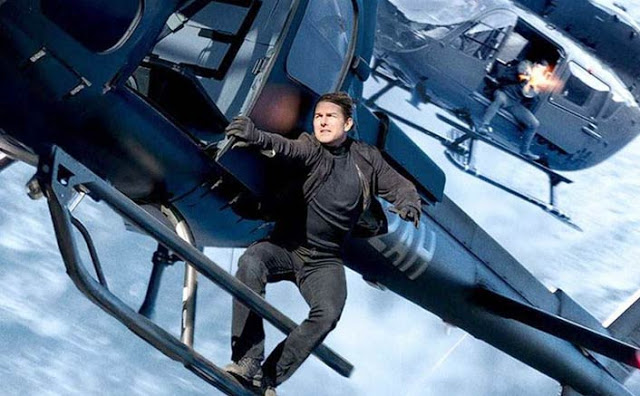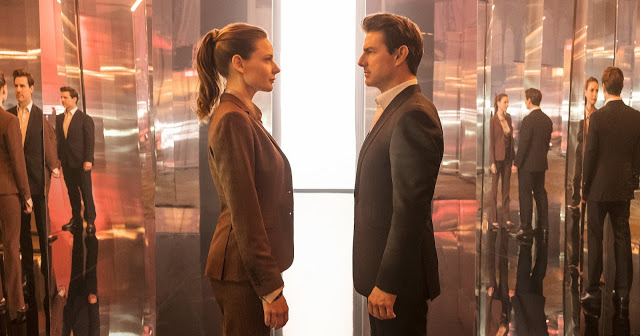In a movie as relentlessly loud as Mission: Impossible—Fallout—a boisterous extravaganza full of screeching tires, whirring rotors, and crackling gunfire—one of the most gripping scenes takes place in virtual silence; the only sound is supplied by Lorne Balfe’s score, which suddenly drops its pounding percussion in favor of weeping strings. Ethan Hunt (Tom Cruise, duh), eternal superagent and mayhem magnet, is spearheading a raid to extract a prisoner from an armored police convoy. It’s a brisk and bloody sequence, full of bullets whizzing through the air and bodies crashing to the ground.
It’s also a feint; turns out, Ethan was just listening to someone else’s plans for the raid and envisioning it in his mind. But he conceives of a smarter and less lethal way of executing the snatch-and-grab, at which point the film rolls the sequence again, resulting in yet another bravura set piece that begins as a similarly efficient incursion but then transforms into a sprawling vehicular chase. You may think of the initial fakeout as a cheat, but I prefer to view it as a distillation of this glorious franchise’s maximalist ethos. The raison d’être of the Mission: Impossible movies is a bit like the first rule of government spending: Why make one amazing action sequence when you can make two for twice the price?
And for double the enjoyment. More is more in the Mission: Impossible universe, and Fallout, the sixth and perhaps most operatic entry of this flabbergasting franchise, embraces that philosophy with reverent zeal. But what continues to distinguish these films from more traditional multiplex fare is their commitment to action cinema as its own form of craft. As a story, Fallout is profligate, overlong, and ridiculous. As a piece of pop art, it’s rigorous, streamlined, and triumphant.
And perhaps just a bit too busy. Directed by Christopher McQuarrie—the first filmmaker in the franchise to return for seconds, following his smashing success in Rogue Nation—Fallout is full of sly meta jokes that link characters and audience, but when somebody erupts, “Why do you have to make things so fucking complicated?” it’s easy to sympathize with his frustration. McQuarrie’s screenplay, whose extended cold open pays homage to the first scene in Brian De Palma’s original adaptation (“Did we get it?” “We got it.”), is a labyrinth of double crosses, secret identities, and red herrings. The real impossibility of this mission is following the byzantine plot as it snakes its way through Europe and Asia, piling up twists and turns to go with the car wrecks and collateral damage. As usual, the world is in peril, thanks to some stolen plutonium, a terrorist group called The Apostles—an offshoot of Rogue Nation’s turncoat cabal, The Syndicate—and a mysterious anarchist known only by the alias John Lark. (I like to think that an entire generation of moviegoers will grow up asking themselves “Who is John Lark?” rather than “Who is John Galt?”) Agendas are obscured, alliances are betrayed, and even faces can’t be trusted; yes, those infamous masks make their share of appearances, though their usage here is more playful and less fraudulent than in earlier installments.
Thankfully, your inability to parse the shadowy dealings and sudden treacheries doesn’t impair your pleasure in the slightest. That’s because Fallout, for all its Bournean narrative gymnastics—the bobbing storyline continues traveling down a few roads established in Rogue Nation, a rare gesture of continuity in this typically standalone series—is less about plot than physics: speed, energy, momentum. It’s a rollicking adventure that’s structured like a Rube Goldberg contraption, one elaborate action sequence deliberately feeding into the next, even more ornate action sequence. Any time your brain begins to protest in confusion, it’s overpowered by the pounding coming from your heart.
Consider just a pair of connected scenes from the first act. Ethan and a colleague, August Walker—a snarling CIA operative who’s described by his boss (Angela Bassett) as “a hammer” and who seems to be built out of iron (he’s played by the man of steel himself, Henry Cavill)—jump out of a plane in the middle of a storm, only for Walker to be struck by lightning and knocked unconscious; Ethan must somehow contort his body through the air to lend Walker his oxygen tank, then deploy his own parachute before thudding into the Parisian night. It’s a rushing sequence, McQuarrie and his cinematographer, Rob Hardy (Annihilation), capturing their perilous freefall in fluid movements, the camera following Cruise as he basically flies through the damn air.
Most movies would happily claim such a scene as their pièce de résistance; for Fallout, it’s mere table-setting for the next showstopper. That would be an electric two-on-one fight inside a bright-white nightclub bathroom, where Ethan and Walker exchange a flurry of kicks and punches with an unknown adversary, a whirlwind of concentrated fury played by stuntman Liang Yang. Most of the film’s action takes place outdoors, but here McQuarrie demonstrates a facility for working in confined spaces, charting everything clearly as his combatants smash through walls and stalls and mirrors. (It’s also where the casting of Cavill and his magnificent mustache most pays off, allowing him to swing his piston-pumping arms like sledgehammers.) The sequence is ferocious but also precise, the flying limbs and shards of glass carefully choreographed into a ballet of snapped bones and spilt blood.
And that combination of elegance and brutality is what really elevates Fallout. Conceptually speaking, it doesn’t sport anything quite as ingenious as the epic Burj Khalifa sequence from Brad Bird’s Ghost Protocol or the iconic dangling-from-the-ceiling heist from De Palma’s film, or even the wildly suspenseful hold-your-breath plunge from Rogue Nation. But there’s a propulsiveness to its pacing—a ceaseless go-go-go best emblematized by a scene where Cruise just runs like hell through the streets of London like some possessed track star—as well as a bruising authenticity to its action. Ethan is basically a superhero—there’s a reason his organization is called the Impossible Mission Force—but his body also suffers serious punishment. A lengthy car-and-motorcycle chase ends with him getting flung from his bike and crashing onto the pavement. When he tries to board a helicopter from beneath as it’s taking off, his foot slips and he slams back down to earth. And when he leaps from a London rooftop and clangs into the side of an adjacent high-rise, you feel the force of the collision, and not just because Cruise actually broke his ankle pulling off the stunt. Fallout is a decidedly modern movie, full of cool gadgets and complex technology, but at its core it’s made out of spit, sweat, and rubble.
Which isn’t to say it’s lacking in the finer things. After all, it has Princess Margaret! Sorry, that would be Vanessa Kirby, here playing a sultry vixen who goes by the fabulous codename “the White Widow” and who exhibits a fondness for deception and satiny dresses. If her motivations remain enigmatic, the same can’t be said of Solomon Lane (Sean Harris), the fiendish heavy of Rogue Nation who has ditched the severe glasses in favor of an unruly, villain-certified beard. The baddies are rarely the draw of the Mission: Impossible films (Philip Seymour Hoffman excepted), but while Lane’s evil designs are fairly rote—destabilize the world’s democracies, sow revolution through chaos, blah blah—his whispery persona remains unnerving, thanks to Harris’ eerie quiet.
Still, we’re here for the heroes, and Fallout ably continues the franchise’s legacy of surrounding Ethan with a strong cast of supportive, sometimes pained, frequently astonished helpers. Ving Rhames and Simon Pegg continue to deftly balance comic relief with genuine concern, while Michelle Monaghan returns to provide a flicker of pathos. Bassett and Alec Baldwin bring wry wit to their stern bureaucrats. The standout, however, is Rebecca Ferguson as Ilsa Faust, the MI6 agent whose chemistry with Ethan remains satisfyingly slippery, blurring conventional lines between love interest, partner, and rival. Ferguson exudes a steely competence that suits the Mission: Impossible pictures, and that professionalism only makes Ilsa’s glimmers of humanity and indecision all the more revealing.
And then there is Cruise, the youngest 56-year-old this side of Dorian Gray. He doesn’t so much perform the part of Ethan as embody him, and while it’s easy to take his natural charisma for granted, it’s also difficult to distinguish actor from character, given that both are so fanatical about their chosen lines of work. I typically don’t care about behind-the-scenes details, preferring to focus on what’s on screen, but Cruise’s maniacal devotion to this franchise is meaningful. He and McQuarrie invest so much care into their action sequences—including several exhilarating car chases, plus an absolutely stupendous climax that begins as a mid-flight duel between helicopters before morphing into a rough-and-tumble brawl on a cliff’s edge—that his passion bleeds into the finished product.
It’s possible that Tom Cruise will keep making these movies until the day he dies; it’s also possible that the day he dies will be spent making these movies, which might literally kill him. That’s a scary thought, but it’s also weirdly heartwarming; there’s something comforting in the knowledge that Cruise continues to give himself over so completely to his art. At one point in Fallout, a character tells Ethan she’s grateful that he’s so obsessed with saving the world, and that she sleeps soundly at night knowing he always will be. That, my admiring friend, makes two of us.
Jeremy Beck is the editor-in-chief of MovieManifesto. He watches more movies and television than he probably should.




